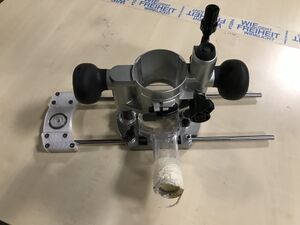Makita DRT50: Difference between revisions
→Additional Upgrades/Accessories: freehand baseplate |
m →Freehand Baseplate: finished last sentence |
||
| Line 39: | Line 39: | ||
[[File:wide DRT50 baseplate.jpg|thumb|installed baseplate]] | [[File:wide DRT50 baseplate.jpg|thumb|installed baseplate]] | ||
The grips were [[woodturning|turned]] from [[Scrap Wood|scrap]] ash wood as the original 3D printed ones felt too small. As suggested by the maker, the bottom edges were broken with 120 | The grips were [[woodturning|turned]] from [[Scrap Wood|scrap]] ash wood as the original 3D printed ones felt too small. As suggested by the maker, the bottom edges were broken with 120 grit sandpaper to improve its sliding ability. | ||
==== Circle Cutting Jig ==== | ==== Circle Cutting Jig ==== | ||
Revision as of 23:21, 3 April 2024
Makita DRT50
| MachineInfoBox Makita DRT50 | |
|---|---|

| |
| Type: | Handheld Routers |
| Location: | Router Table |
| Access Requirements: | Handheld Router Introduction |
| Status: | Working |
| Manual: | Makita |
| Tutors: | Lukas NitramLegov Pakue Johannes Luzian Keno Utis Björn Jaggi2 Mobell |
The router has its own box (Makpack) with all its accessories (DRT50RTJX2). It is battery powered with 18V Makita lithium batteries that are shared with our other Makita tools like the cordless drill. The set consists of:
- flat surface attachment w/o grips
- flat surface attachment with grips
- edge cut attachment
- 2x vacuum dust attachment
- long grip (can replace one of the stud grips on the flat surface attachment)
- roller attachment for routing edges with bits lacking a bearing
-
Surface attachment without grips
-
Surface attachment with roller added
-
Edge attachment that can be angled -45º – 30º
-
Surface attachment with grips
-
Surface attachment with grips (one replaced with the long variant)
Dust Extraction

There are two different dust collection pieces, depending on which attachment you're using. Either one will need the black flexible adapter seen in the photo to fit on our shop vacs.
Additional Upgrades/Accessories
Freehand Baseplate
Lukas donated a custom baseplate bought from a local blogger (holzundleim.de). It should allow for much easier freehand routing!
It is made from HPL ("Resopal") and can be screwed to the gripless surface attachment in place of its small round baseplate. To dive into the workpiece, let the baseplate rest on its rear (straight) side and slowly allow it to tip forward after the router bit reaches full speed.

The grips were turned from scrap ash wood as the original 3D printed ones felt too small. As suggested by the maker, the bottom edges were broken with 120 grit sandpaper to improve its sliding ability.
Circle Cutting Jig
Patrick made a 3D printed circle cutting jig that is used in combination with the surface attachment. Cutting range is ~200-720 mm ⌀ (depending on the router bit used).





